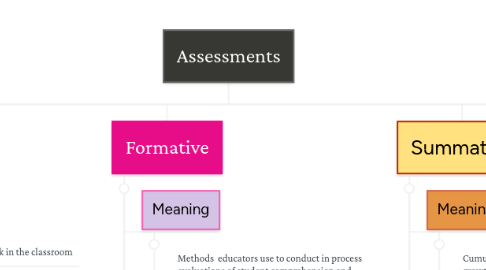
1. Resources
1.1. Study.com (2017) What is Diagnostic Assessment - Definition and Examples. Retrieved from: study.com/academy/lesson/what-is-diagnostic-assessment-definition-examples.html
1.2. Coffey., H. (2017) Summative Assessment. Retrieved from: http://www.learning.org/lp/pages/5233
2. Diagnostic
2.1. Meaning
2.1.1. Is a form of pre assessment
2.1.2. A guide to lesson and curriculum planning
2.2. For Learning
2.2.1. To determine students individual strengths, weakness, knowledge and skills prior to instruction.
2.3. Pros
2.3.1. Allows teachers to plan
2.3.2. Provides information to individualize
2.3.3. Creates a baseline
2.4. Cons
2.4.1. Causes educators to make incorrect inferences about a students ability
2.5. Examples
2.5.1. Unit Pre tests
2.5.2. Pre quizes
3. Self
3.1. Meaning
3.1.1. Requires students to reflect on their own work
3.2. For Learning
3.3. Pros
3.3.1. Encourages students to reflect
3.3.2. Allows students to see and reflect on their peers
3.3.3. Focuses on development
3.4. Cons
3.4.1. Increase lecture workload
3.4.2. Perceived as process of presenting inflated grades
3.4.3. Students feel not equipped
3.5. Examples
3.5.1. Logs
3.5.2. Diaries
3.5.3. Assessment Criteria
4. Peer
4.1. Meaning
4.1.1. Students assess other's work in the classroom
4.2. For Learning
4.3. Pros
4.3.1. Student involvement and responsibility
4.3.2. Focuses on development of students judgment skills
4.3.3. Reduces the free rider problem
4.4. Cons
4.4.1. Students will award everyone the same grade
4.4.2. Students may be reluctant to give feedback
4.4.3. Students may be discriminated
4.5. Examples
4.5.1. Rubrics
4.5.2. Have students highlight peers work
4.5.3. Worksheets that peers can write what is good and what needs to be improved on.
5. Formative
5.1. Meaning
5.1.1. Methods educators use to conduct in process evaluations of student comprehension and learning needs.
5.2. Of Learning
5.2.1. This helps educators see what they need to do to aid in learning.
5.3. Pros
5.3.1. Continues improvements
5.3.2. Not graded
5.3.3. Less reteaching
5.4. Cons
5.4.1. Time
5.4.2. Lack of training
5.4.3. Misread feedback
5.5. Examples
5.5.1. Observations
5.5.2. Graphic Organizer
5.5.3. Visual representamos
6. Summative
6.1. Meaning
6.1.1. Cumulative evaluations to measure student growth after instruction
6.2. Of Learning
6.2.1. This will allow educators to reevaluate their lessons.
6.3. Pros
6.3.1. Motivations
6.3.2. Gives insight
6.4. Cons
6.4.1. Test scores linked to educator evaluations
6.4.2. Not always accurate
6.5. Examples
6.5.1. Projects
6.5.2. Portfolios
6.5.3. Demonstrations
7. Authentic
7.1. Meaning
7.1.1. Evaluate students abilities in real world situations
7.2. For Learning
7.3. Pros
7.3.1. Leads to improved teaching
7.3.2. Views learning as a process
7.3.3. Promotes creativity
7.4. Cons
7.4.1. Time intestine
7.4.2. Challenge to provide consistent grading
7.4.3. Unique nature may be unfamiliar
7.5. Examples
7.5.1. Scoring Guides
7.5.2. Portfolio
7.5.3. Oral interviews
8. Performance Based
8.1. Meaning
8.1.1. Measures students ability to apply skills and knowledge
8.2. Of Learning
8.3. Pros
8.3.1. Student Motivation
8.3.2. Engages students
8.3.3. Student creativity
8.4. Cons
8.4.1. Costly approach
8.4.2. Time Consuming
8.4.3. Training
8.5. Examples
8.5.1. Projects
8.5.2. Portfolios
8.5.3. Demonstration
9. High Stakes
9.1. Meaning
9.1.1. Used to make important decisions about students
9.2. Of Learning
9.3. Pros
9.3.1. Helps educators create learning plans
9.3.2. Always public available
9.3.3. Can improve test taking abilities
9.4. Cons
9.4.1. Other subjects to get pushed out
9.4.2. More pressure on educators
9.4.3. More pressure on parents and students
9.5. Examples
9.5.1. Graduation test
9.5.2. Milestones
9.5.3. Benchmarks
9.5.4. SLO'S
10. Portfolio
10.1. Meaning
10.1.1. Is a collection of student work
10.2. Of Learning
10.2.1. Measures students ability over time
10.3. Pros
10.3.1. Shows sophistication
10.3.2. Identify student weakness
10.3.3. More teacher control
10.4. Cons
10.4.1. Inter rater reliability must be addressed
10.4.2. Portfolio will be no better than the quality of collected work
10.5. Examples
10.5.1. Working portfolios
10.5.2. Best work portfolios
10.5.3. Assessment portfolios
